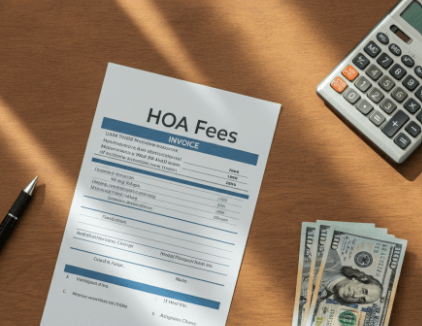Homeowners’ associations (HOAs) are prevalent in numerous residential communities across Florida, providing valuable services and amenities to their members. However, homeowners often needed clarification on whether the fees paid to these associations offer any tax benefits. With the tax season on the horizon, one critical question arises: “Are HOA Fees Tax Deductible in Florida?” In this blog, we will delve into the specifics of HOA fees and explore their potential tax implications. Are HOA Fees Tax Deductible in Florida? Read on to uncover the details that could significantly impact your financial planning.
Real estate investors Steve Daria and Joleigh have long debated the nuances of HOA fees in their Florida properties. They understand whether these tax-deductible fees could provide significant financial advantages for investors like them. By examining the tax implications of HOA fees, Steve Daria and Joleigh aim to optimize their investment strategies and improve their financial planning.
Introduction to Tax Deductible HOA Fees
Before we delve into the question, “Are HOA fees tax deductible in Florida?” it’s important to understand the nuances of HOA fee deductibility for homeowners aiming to optimize their tax strategy and lessen their tax burden.
HOA fees typically cover a range of payables, including repairs, landscaping, maintenance, and community amenities.
However, not all of these costs are eligible for tax deductions.

In general, HOA fees paid for the maintenance and upkeep of common areas, facilities, and services within the community are not tax deductible for individual homeowners.
These expenses are considered personal and are not eligible for deduction on federal income taxes. However, certain situations allow a portion of HOA fees to be tax deductible.
Are HOA Fees Tax Deductible in Florida?
Are HOA fees tax deductible in Florida? The short answer is that it depends.
Generally, HOA fees paid on your residence are not tax deductible because the IRS considers these fees personal expenses.
However, some exceptions and strategies can make certain aspects of these fees deductible under specific circumstances.
Get An Offer Today, Sell In A Matter Of Days…
When are HOA Fees Tax Deductible in Florida?
Understanding the specific scenarios in which HOA fees are tax deductible in Florida can significantly impact your financial planning.
For Investment Properties
If you own a property within an HOA and rent it out, the HOA fees you pay become a crucial part of your rental expenses.
These fees cover the costs of maintaining common areas, amenities, and services the HOA provides, such as landscaping, security, and recreational facilities.
When you rent out the property, the IRS allows you to deduct these fees as necessary expenses for maintaining your rental property.
This deduction can be claimed on Schedule E of your tax return, where you report your rental income and expenses.
Example:
- Scenario: John owns a condo in a Florida community governed by an HOA and rents it to tenants.
- Tax Benefit: John can deduct the HOA fees as part of his rental expenses on his tax return, reducing his taxable rental income.
Home Office Deduction
For homeowners who use part of their HOA-governed property as a home office, a portion of the HOA fees may be deductible.
This deduction is computed based on the percentage of your home used for business purposes.
It’s essential to meet the IRS criteria for home office deductions and to keep detailed records.
Example:
- Scenario: Sarah operates a freelance graphic design business in an HOA community from her home.
- Tax Benefit: Sarah can deduct a portion of her HOA fees proportional to the space used for her home office on her tax return.
Special Assessments
While regular HOA fees are generally not deductible on your residence, special assessment fees for improvements or repairs might be deductible if they meet specific criteria.
These must be one-time fees for improvements that increase the property’s value.
Example:
- Scenario: Mike’s HOA imposes a special assessment for a new community pool that significantly enhances property values.
- Tax Benefit: Mike may be able to deduct this special assessment fee as an itemized deduction on his tax return.
Strategies for Maximizing Deductions
Navigating the complexities of Florida tax deductions, especially HOA fees, requires strategic planning.
Below, we uncover the various strategies homeowners can employ to maximize their deductions and potentially reduce their tax liability.
Rental Property Documentation
Keep a full record of all expenses related to your rental property, including HOA fees.
This documentation will be crucial for claiming deductions.
Example:
- Scenario: Lisa rents out her townhouse and records all HOA fee payments.
- Benefit: Lisa’s thorough documentation helps her accurately deduct these fees from her rental income on her tax return.
Home Office Precision
If claiming a home office deduction, ensure the space is exclusively and regularly used for business.
Calculate the exact percentage of your home dedicated to this purpose to deduct a portion of your HOA fees accurately.
Example:
- Scenario: Robert uses 20% of his home for his online business and calculates his HOA fee deduction based on this percentage.
- Benefit: Robert can confidently claim a portion of his HOA fees as a business expense on his tax return.
Consult a Professional
Tax laws can be intricate and are subject to frequent changes.
Consulting with a tax advisor can offer personalized guidance, helping you maximize your deductions while ensuring compliance with IRS regulations.
Example:
- Scenario: Maria is still determining her eligibility for HOA fee deductions.
- Benefit: By consulting a tax professional, Maria receives tailored advice that helps her maximize her deductions and ensures compliance with tax laws.

Frequently Asked Questions about Are HOA Fees Tax Deductible in Florida
In the section below, we address some of the most frequently asked questions regarding the tax deductibility of Homeowners Association (HOA) fees in Florida, providing clarity on this often confusing subject.
Can I deduct HOA fees if I work from home?
Yes, but only a portion based on the percentage of your home used as a home office. The space must meet IRS requirements for home office deductions.
Are special assessment HOA fees tax deductible?
Special assessments for capital improvements may be deductible if they increase your property’s value.
Regular assessments for maintenance and repairs are not.
How do I report deductible HOA fees?
Deductible HOA fees are reported differently based on their nature.
Rental property expenses are reported on Schedule E (Form 1040), while home office deductions are part of Schedule C (Form 1040) or Form 8829 if applicable.
Are HOA fees tax deductible in Florida for a second home?
Generally, HOA fees for a second home used for personal purposes are not deductible.
However, if the second home is rented, the costs may be deductible as rental expenses.
What documentation should I keep for HOA fee deductions?
Keep detailed records of HOA fee payments, special assessments, and documentation of your property’s business or rental use.
This includes receipts, invoices, and records of how the property is used.
Conclusion
Navigating the complexities of HOA fees and their tax implications can be challenging, especially in Florida, where such communities are common. While HOA fees on your primary residence are generally not tax deductible, there are specific situations—such as rental properties or home offices—where deductions are possible.
By understanding these nuances and seeking professional guidance, you can reduce your tax liability and make informed decisions about your property in an HOA community. Remember, every taxpayer’s situation is unique, and the above strategies should be tailored to fit your specific circumstances. Always consult with a tax professional to ensure you’re making the most of potential tax-deductible HOA fees and staying in line with current IRS regulations.
**NOTICE: Please note that the content presented in this post is intended solely for informational and educational purposes. It should not be construed as legal or financial advice or relied upon as a replacement for consultation with a qualified attorney or CPA. For specific guidance on legal or financial matters, readers are encouraged to seek professional assistance from an attorney, CPA, or other appropriate professional regarding the subject matter.

